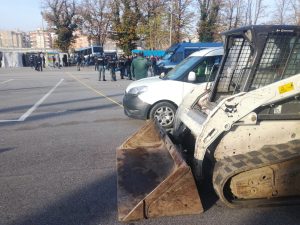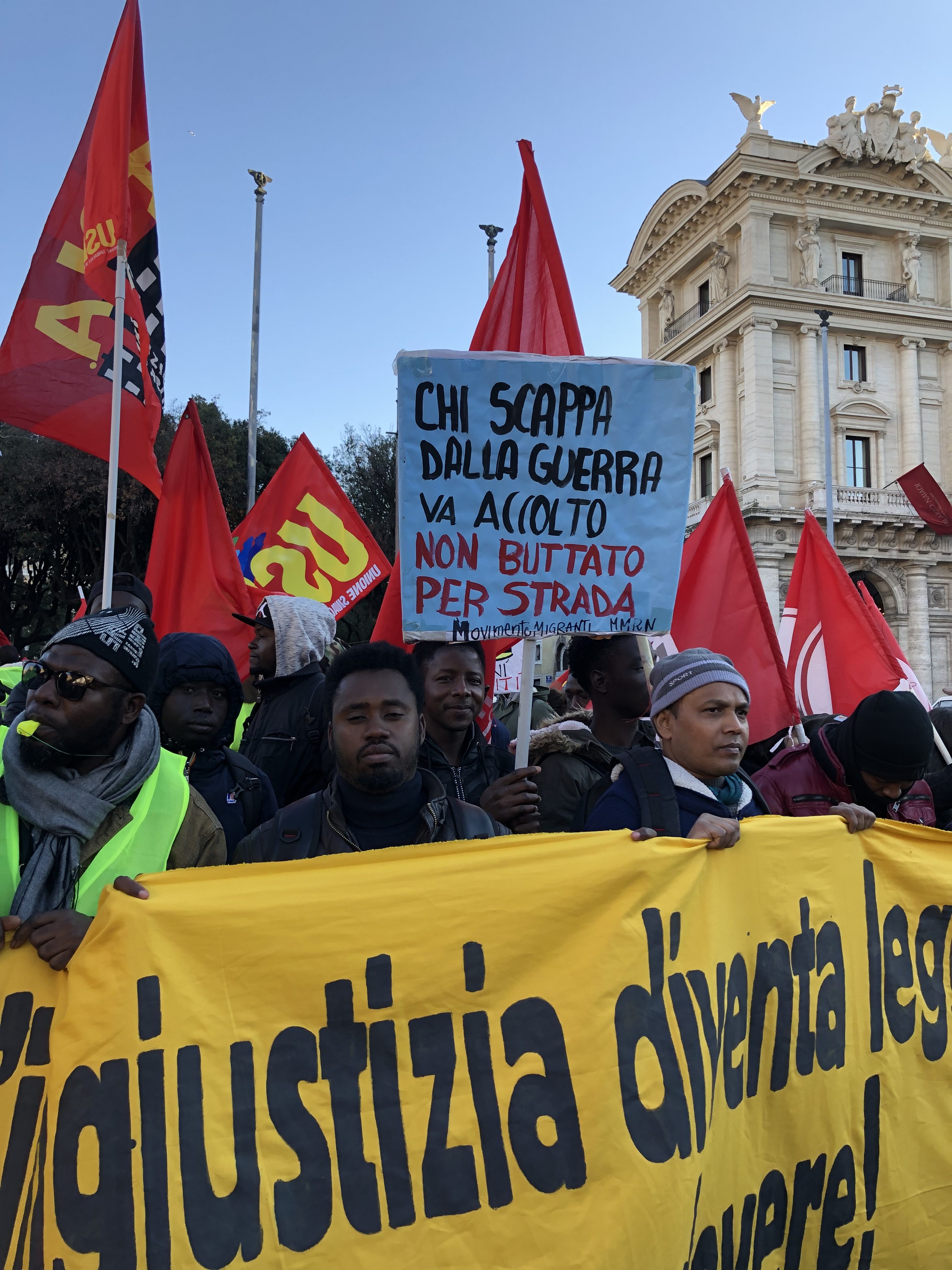Thousands of people to be left homeless because of ‘Salvini decree’
Hardline immigration policies introduced by the rightwing government are having devastating effects on migrants in Italy
By Emma Biginelli Macchia in Rome
Thu 4 April 2019
 A group of migrants is evicted from a camp. Photograph: Annalisa Camilli
A group of migrants is evicted from a camp. Photograph: Annalisa Camilli
Migrants in Italy are being kicked out of the so-called welcome centres and many will be left on the streets as no solutions are put in place.
The Salvini Decree, named after Matteo Salvini, interior minister and leader of the far-right party League, was passed at the end of November 2018, and is already having disastrous effects on immigrants.
The most important measure introduced by the decree is the abolishment of the humanitarian protection, which was recognised to immigrants who were not eligible for the refugee status but could not be expelled because they would face prosecution if they were to go back to their countries. The majority of the migrants who arrived in Italy in the past few years have been granted the humanitarian permit, with around 100,000 estimated permit holders in the country.
The loss of this humanitarian permit means that thousands of people will become irregular immigrants and as a consequence will be sent out of welcome centres such as CARA (Welcome centres for asylum seekers) and CAS (extraordinary welcome centres). They won’t be allowed to stay in temporary reception centres nor in the centres thought especially for refugees (SPRAR).
Salvini’s goal would be to send all illegal immigrants back to their countries, but to deport that many people is practically impossible: deporting one person usually costs around £4,000. Furthermore, the lack of reciprocal agreements with most African countries makes it even more difficult to deport immigrants, as those countries will often refuse to take care of them. As a consequence, they are left homeless in Italy.
Roberto Viviani is the president of Baobab, an association in Rome which helps migrants who don’t have a place to stay. He’s been working for Baobab since 2015. Baobab volunteers help people with medical and legal issues, give them clothes, food and shelter and organise events, visits and sports tournaments.
 The eviction of Baobab’s camp in November 2018. Photograph: Baobab.
The eviction of Baobab’s camp in November 2018. Photograph: Baobab.
Baobab’s base is now at the Tiburtina Railway Station in Rome. Roberto said that the situation is more and more difficult now that Salvini is in power. He said: “We’ve been evicted 27 times in the past three years, but now it’s more difficult to find another place after an eviction.”
Their last camp, at the railway station, was closed in November 2018. At 6 in the morning, the police woke the migrants up, around 150 of them, and left them without a place to sleep at night. Now, during the day, they spend their time together at the railway station, but they cannot sleep together anymore and they have to spend the nights in different places, often alone or in small groups.
Roberto Viviani said: “Now we’re waiting for the people who will be sent out of institutional centres, there will be more than a thousand in Rome only.”
He also said the big criminal organisations in Italy will find a lot of people with no choice but to get involved with them. “It seems like Salvini wants to create more and more confusion to increase the sense of insecurity and fear in the population. A lot of people will be in the streets because they cannot send people back to their country.”
Watch the interview here:
Also in November, 24 people were forced to leave the reception centre near Crotone, in the Calabria region, and they didn’t have anywhere else to go. In January more than 500 people were kicked out of a refugee reception centre in Castelnuovo di Porto, a town close to Rome. Another 50 were evicted in February from another welcome centre in Sicily.
Roberto Viviani added: “You cannot think that people disappear in a black hole after an eviction, you have to plan a solution.”
Since the decree was passed, Italy has rejected a record number of asylum applications, with 24,800 applications rejected in the last five months. According to figures released by the Institute for International Political Studies (ISPI), only 2 per cent of the asylum applications have been accepted, down from 25 per cent during the same period in 2017.
Data show that more than 7,000 people have been refused the protection since October. In January 2019, there were just 159 approvals in total, while in January 2018 there were 2,091. From June 2018, around 40,000 applications for the humanitarian permit have been refused, ISPI said.
Thus, the number of illegal immigrants in the country is set to increase, and, due to the decree, there are already 40,000 more irregular immigrants. According to ISPI’s estimates, more than 670,000 asylum seekers will find them selves living irregularly in Italy in 2020, because the Italian government doesn’t have the power to deport them.
The new immigration measures not only affect people who have just arrived in Italy, but also those who have been living in the country for years, as the decree doubled the length of time people have to wait for before they can be granted the Italian citizenship.
Applications can now be dealt with within 48 months (4 years) instead of the 24 months stated by the previous law. Furthermore, the decree is retroactive, which means it applies to the applications submitted before the decree was passed.
Elizabeth Arquinigo is one of those people affected by these changes. The 28-year-old was born in Peru, but has been living in Italy for 18 years. She submitted her application for citizenship in 2017 and thought she was going to become an Italian citizen by 2019. Now, due to the Salvini decree, she has to wait another 2 years.

“Now I fit in that category of people who are in some sort of limbo, and don’t know whether they will become citizens or not. Nothing is certain anymore. And in the meantime you can’t move, you have to stay in Italy.” According to the association Italiani senza cittadinanza (Italians without citizenship), a million more people are in the same situation as Elizabeth.
She said: “This decree affects all those people who have been in Italy for years and have already asked for the Italian citizenship. It should be unconstitutional for such a decree to be retroactive, laws should look at the future.”
When Elizabeth asked for the citizenship in 2017, her application met all the requirements: 10 years of legal residence in the country and 3 years of tax payments. So she started to plan her life based on the fact that the process would take 2 years. Now she’s having all kind of problems, for example with all the papers she needs to go and study in the Netherlands for a masters she applied to, as she’s treated as a non-community citizen.
A few months ago she wrote an open letter to Matteo Salvini, Italy’s interior minister. “I explained to him that he’s ruining lives. He always says that we regular immigrants, as opposed to clandestine migrants, are good people and are friends of his. In my letter I tried to expose his false rhetoric. You don’t go and ruin your friends’ lives, you help them. Instead he made this decree, I really don’t understand the reason why. She also published a book called “Letter to the Italians like me”.
“It sucks,” she says, “and I’m tired. This decree only makes being a foreigner more difficult. You have no certainties, the condition of foreigners in Italy is precarious from every point of view.”

